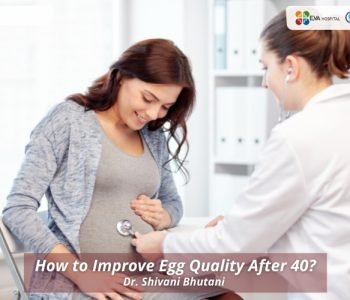 Eva Hospital
Eva Hospital
How to Improve Egg Quality After 40?
Overview
The quality of the eggs is the most important factor for a successful pregnancy and is a matter of concern for women over 40, how to get pregnant naturally or with the help of IVF.
Women are born with about one to two million eggs out of which only 300-500 mature and become available for use throughout their lifetime.
As one age, the quality of eggs deteriorates and so does the ability to conceive. Poor egg quality can also cause chronic health problems in the offspring.
A woman’s odds of achieving pregnancy after 40 are considerably decreased and the odds of a pregnancy loss in case a pregnancy occurs are quite higher.
The main important factor in reduced pregnancy and increased pregnancy loss rates is egg quality.
Egg Quality and Age
The best measure of egg quality usually is the proportion of a woman’s eggs that are genetically normal. As the woman ages, the amount of genetically normal eggs she produces decreases.
The ovaries also become less able to meet the demands of a growing egg as the women age, so the eggs in a 40+-year-old woman are more likely to have errors in their genetic makeup.
Read More: Pregnancy after 40. Benefits and Risks
Ways to Improve Egg Quality after 40
Though nothing can be done to prevent the regular loss of eggs as one age, there are several fertility supplements one can take and dietary and lifestyle changes that can be made to improve egg quality after 40 and ultimately improve one’s chances of pregnant
1. The Fertility Diet
A diet high in fat and low in carbohydrates helps to improve overall fertility and egg quality.
Fat is crucial for the development of every cell in the body, giving the body energy, supporting cell growth, absorbing nutrients, and producing hormones.
The eggs are also made of fat like everything else in the body so the fat provides eggs with the energy & nutrition needed to develop properly.
2. Quality Sleep
Quality sleep is related to egg quality and fertility directly. Our bodies repair cells, rebuild energy and release hormones required for reproductive and other processes while we sleep, allowing the body to support the development of high-quality and healthy eggs.
3. Avoid Smoking
Nicotine impairs egg quality and quantity. Also, Smoking increases egg loss in the ovaries and increases the number of abnormal eggs produced.
4. Avoid Caffeine and Alcohol
Limiting caffeine consumption and restricting or completely excluding alcohol while you are trying to get pregnant helps to improve egg quality.
5. Manage Stress
Stress can cause many imbalances and issues throughout the body related to fertility and egg quality. Our bodies produce increased levels of cortisol and prolactin when we are stressed and they can decrease ovulation, impeding egg production.
6. Light Exercise/ Yoga
Exercises like walking, stretching, and yoga are great ways to reduce stress, increase blood flow to your reproductive organs and balance the immune system. Moreover, obesity can increase oxidative stress on the cells.
7. Supplements
The use of Fertility supplements to improve the egg quality of women over 40 can prove beneficial.
Some supplements which have been shown to increase antioxidant levels, and support a healthy ovarian environment to improve egg quality are:
- Fish Oil (Omega 3s): Omega 3s is a practical way to delay ovarian aging and can help to preserve fertility and encourage the production of higher quality eggs, especially for women over 40.
- Co-Enzyme Q10 (Coq10): Co-enzyme q10 levels within the body decrease as we age. It is vital for women over the age of 40 to take Co q10 supplements when they are trying to get pregnant. Co q10 is the primary antioxidant that protects and supports mitochondria. The number of healthy mitochondria and levels of CoQ10 decline as women age. CoQ10 supplements can improve the energy in the egg cells.
- Vitamin A: Vitamin A plays a significant role in ensuring egg quality and also blastogenesis, an essential portion of embryo development. Other Vitamins and Nutrients which aid Egg Quality after 40 are:
- Vitamin E has strong antioxidant effects and can reduce oxidative stress and increase follicular blood supply that is vital for the development of high-quality eggs.
- Zinc and certain B vitamins play a key role in DNA synthesis, important for the development of high-quality oocytes.
- Adequate folate levels help in promoting oocyte quality, maturation, fertilization, and implantation.
- DHEA supplements can turn around low levels of androgens in the ovaries which may result in reduced ovarian reserve and poor-quality eggs.
- Glutathione’s powerful antioxidant fights free radicals and reduces the oxidative stress on the egg cells, stemming in healthier eggs and hence, better embryos.
Additional Note
Generally, women over the age of 40-41 years are instantly referred for donor eggs because of their eggs being of poor quality.
Studies have shown that preponing the time of egg retrieval in women with poor ovarian reserve or premature ovarian failure, can make it possible to extract better quality eggs and improve the success rates of IVF.
Otherwise, Donor eggs are an optimal option for women over 40 who wish to get pregnant.
Dr. Shivani Bhutani a renowned infertility specialist from Eva Hospital lays great emphasis on improving Egg quality before opting for Fertility treatments.
She has been treating patients with poor egg quality with adequate treatments for several years.
[/vc_column_text][/vc_column][/vc_row]